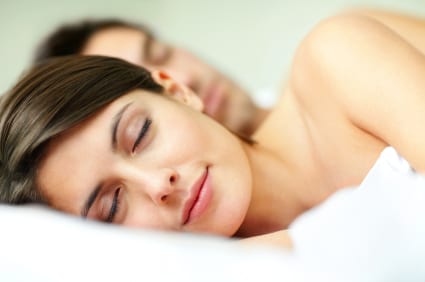Isn’t it amazing how you can be SO tired yet it’s hard for you to fall asleep at night? Well, you’re not alone. Sleep deprivation is running rampant and many experts are blaming our fast-paced, unhealthy lifestyle. If you’re having trouble sleeping, here are 7 tips for a better night’s rest…finally!
1. Get on a Routine
Go to bed and get up at the same time every day, even weekends. This routine will reinforce your body’s sleep-wake cycle and can actually help you fall asleep at night.
2. Sleep in Complete Darkness
Even the smallest amount of light in a room could disrupt your internal clock and interfere with your sleep. Light signals to your brain that it’s time to wake up. Close the bedroom door, get rid of nightlights and shut the blinds. You may even want to cover up that digital alarm clock because if you happen to wake up and see bright lights, you will have a harder time falling asleep. Or, an even easier solution: wear an eye mask to bed.
3. Get Rid of Bedroom Distractions
Your bed should just be for sleeping. If you have gotten into the habit of watching TV or even doing work in bed, you might find it difficult to relax and fall asleep. Keep your bedroom distraction-free.
4. Watch Your Food and Drink Intake Before Bed
The recommended time to wait after dinner before going to sleep is three hours. A full stomach, or even an empty stomach, may interrupt sleep. And watch those caffeinated drinks! If you must have your daily dose of coffee, tea or soda, make sure you indulge before 2pm since caffeine’s effects may last for up to 8 hours! Drinking any fluids less than two hours before bed may increase the likelihood you will have to get up in the middle of the night to use the bathroom. As for alcohol, while it may make you feel sleepy, it could also potentially reduce sleep quality. Stick to foods that contain high levels of tryptophan, such as milk, turkey, yogurt, ice cream, soy beans, tuna, and peanuts. Tryptophan helps the body produce serotonin in order to relax.
5. Maintain Your Mattress
Your poor sleep could be a direct result of your mattress. Replace your mattress after 5-7 years of use. If you can feel the springs against your body when you lay down, it’s time to go mattress shopping. Many people find tempurpedic or foam mattress more comfortable than a spring mattress.
6. Exercise
Ever wonder why you sleep so much better after you exercise? The body uses sleep to repair and recover. If there isn’t much to recover from, your body’s sleep cycle could be disturbed. But, don’t exercise right before bed, because it boosts your heart rate and might make you even more awake. Additionally, being overweight can increase your risk of sleep apnea, so working out has multiple benefits for your sleep.
7. Do Something Calming Before Bed
Some people find it helpful to listen to relaxation CDs or reading something uplifting. These can help your brain gear down for sleep. Not all reading materials are recommended right before bed, however. A mystery or suspense novel could tempt you to read for hours instead of going to sleep!





